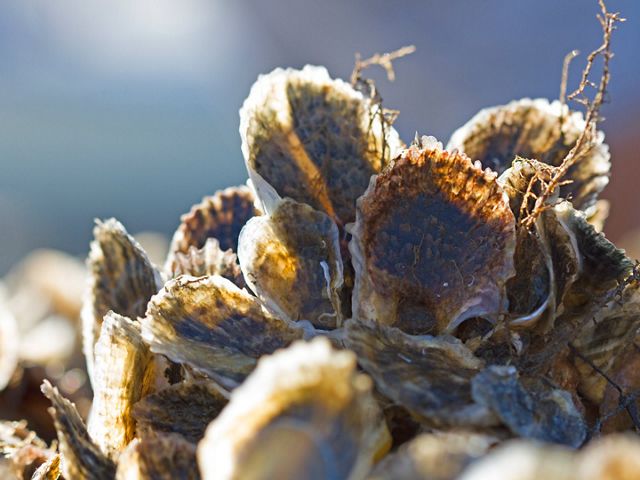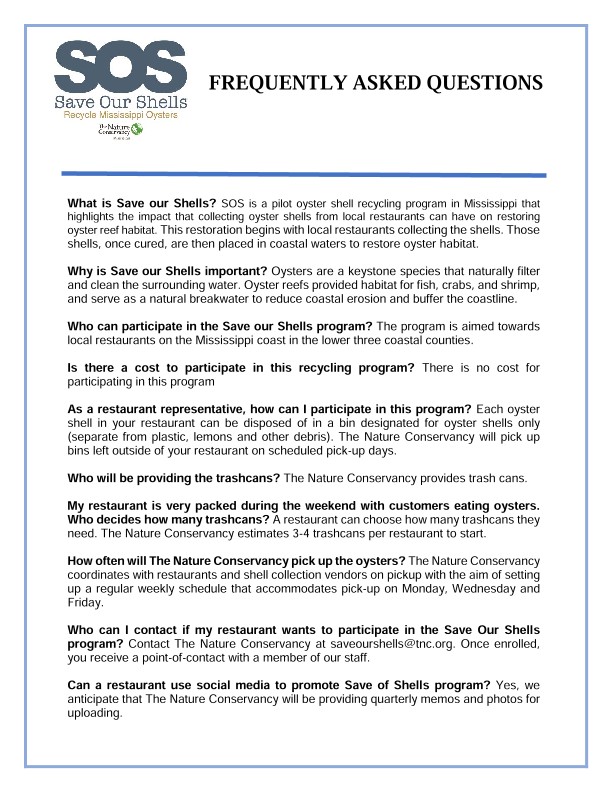Save Our Shells
Recycling shells can help bring oysters back to Mississippi’s Gulf Coast.
In 2023 The Nature Conservancy launched a pilot oyster shell recycling program in Mississippi. Save Our Shells, or SOS, highlights the impact that collecting oyster shells from local restaurants can have on restoring oyster reef habitat and a once thriving industry along the Gulf Coast. Save Our Shells is paid for by an award from the Mississippi Department of Environmental Quality in partnership with the Gulf Coast Ecosystem Restoration (RESTORE) Council.
Invite Your Favorite Restaurant to Join SOS!
Email saveourshells@tnc.org to benefit Mississippi’s coastline and oyster industry.
Connect with usWhere did our Gulf oysters go?
Fishermen once harvested hundreds of thousands of oysters in waters surrounding Biloxi, Mississippi, once known as the “seafood capital of the world.” That was before Hurricane Katrina and before the BP oil spill. The Mississippi oyster industry no longer exists as a result of devastation caused by these events.
Once a foundation of the Gulf ecosystem, oyster reefs extended for miles across the Gulf’s bays and estuaries. Today, across much of the Gulf, wild oysters are in steep decline. It is a catastrophic loss that affects local economies and the long-term health and productivity of the Gulf waters.
Quote: Tom Mohrman
With this program, enjoying oysters can be an act of conservation. It is an opportunity to support the local fishing community and local restaurants and to give back to the environment while growing a valuable natural resource.
Nuts & Bolts
The SOS pilot oyster recycling program—a partnership between The Nature Conservancy and the Mississippi’s Department of Environmental Quality—is funded by the RESTORE Council, a federal body created to award billions of dollars for restoration projects in five Gulf Coast states affected by the BP oil spill. The initial goal of SOS was to determine whether the Mississippi could support supplying, collecting, storing and deploying a long-term oyster shell recycling program. Now the partners are working with local restaurants to establish a pipeline of oyster shells to help restore the Gulf Coast’s once abundant reefs.
Once collected from participating restaurants, oyster shells are delivered to the Mississippi Department of Marine Resources to be processed, cured and integrated into restoration projects as a natural material known as “cultch.” The cultch attracts and supports oyster larvae that grow and produce new oysters.

Did You Know?
One adult oyster can filter up to 50 gallons of water each day. Multiplied by an entire reef of thousands, the impact on coastal water quality is substantial.
What's so special about oysters?
Oysters are a keystone species that naturally filter and clean the surrounding water. In addition to filtering water, oyster reefs provide habitat for fish, crabs and shrimp, and serve as a natural breakwater to reduce coastal erosion and buffer the coastline. When reefs are healthy, they can also provide a seemingly inexhaustible supply of oysters for the table. Despite their many benefits, oyster reefs are the most threatened marine habitat on Earth.
Restoring Oyster Reefs Across the U.S.
Oyster restoration has long been a priority for TNC. In fact, Mississippi’s SOS oyster shell recycling program joins other efforts that are underway in at least 14 other states, including all of the other Gulf states.
Working with partners, TNC aims to turn the tide of overharvest, pollution, disease and catastrophic events that have decimated oyster populations over the last hundred years. Dramatic changes in the public policy arena, coupled with emerging scientific understanding and the creation of large-scale oyster sanctuaries, are providing a clear path forward to restore this keystone species.
Download
Save Our Shells
Invite your favorite restaurant to join SOS to benefit Mississippi's coastline and oyster industry. Email saveourshells@tnc.org to participate!

Stay in the Loop
Sign up for news updates from Mississippi!







